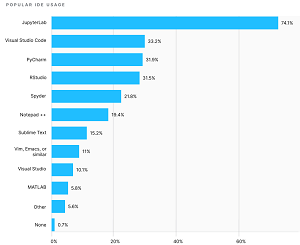News
No. 2 Data Science IDE? VS Code
It's not surprising that a data science/machine learning survey says most pros use a Jupyter-based IDE for their work, as Jupyter Notebooks (and Python) are pervasive in the industry.
What might be surprising, though, is the No. 2 choice for an IDE: Visual Studio Code, which is actually an open source, cross-platform code editor from Microsoft that acts more like a full-fledged integrated development environment through the use of a vast ecosystem of extensions for specific functionality.
VS Code's popularity in the data science camp was revealed in a survey by Kaggle, a Google subsidiary that fosters an online community of data scientists and machine learning practitioners, which recently published its "State of Machine Learning and Data Science 2020" report.
The report states that the popularity of VS Code increased from the previous year's report, but it's hard to tell by how much. That's because, inexplicably, VS Code and the full-fledged Visual Studio IDE were grouped together in the 2019 report, despite being completely different products.
So, in being separated for the 2020 report, VS Code was found to be the tool of choice of 33.2 percent of respondents, behind No. 1 JupyterLab, which might have an edge because it's "the next-generation web-based user interface for Project Jupyter." The Visual Studio IDE, meanwhile, garnered 10.1 percent of respondent mentions. The combined total of more than 43 percent of respondents is a significant increase from last year when VS Code and Visual Studio IDE combined for less than 30 percent. So, even though Jupyter tools still reign supreme, their dominance may be eroding, as Kaggle itself pointed out.
"Jupyter-based IDEs continue to be the go-to tool for data scientists, with around three-quarters of Kaggle data scientists using it," the report said. "However, this has decreased from last year's 83 percent. Visual Studio Code is in the second spot with just over 33 percent."
In the 2019 report, the category of Visual Studio/Visual Studio Code was fourth, behind the Jupyter camp, RStudio and PyCharm.
 [Click on image for larger view.] Top IDEs (source: Kaggle).
[Click on image for larger view.] Top IDEs (source: Kaggle).
The increased popularity of VS Code among data scientists shouldn't be too much of a surprise, though, as Microsoft has heartily championed its use with Python -- especially for data science -- even though it offers its own flagship programming language, C#. Python has taken over the data science/machine learning world, and Microsoft has in turn invested heavily in Python. The company not only hired the creator of the super-popular Python extension for VS Code, it even hired the creator of Python itself.
And the popularity of that Python extension just continues to grow. It's now at a staggering 31.1 million installations at the time of this writing, far ahead of the No. 2 tool in the VS Code Marketplace, C/C++ (about 17.3 million installations).
Beyond VS Code, though, Microsoft didn't make an exceptionally strong showing in the report. Here are how some other Microsoft-centric data science-related products fared:
- Enterprise Cloud Usage: Microsoft Azure (17.1 percent) trailed AWS (48.2 percent) and Google Cloud (29.4 percent)
- Enterprise Cloud Product Usage: Azure Cloud Services (19.8 percent), Microsoft Azure Container Instances (12.5 percent), Azure Functions (9.3 percent) placed fifth, seventh and tenth, with Amazon EC2 topping the chart at 40.6 percent
- Enterprise Machine Learning Product Usage: Azure Machine Learning Studio garnered mentions by 12.9 percent of respondents, while "No/None" actually was the overwhelming top reply, at 55.2 percent (with Amazon SageMaker following at 16.5 percent)
- Data Scientist Usage of Business Intelligence Tools: "None" again led this category (38.8 percent), with Microsoft Power BI in third (27 percent) behind Tableau (33.3 percent)
- Database Usage by Data Scientists: Microsoft SQL Server was third (24.9 percent) behind MySQL (35.6 percent) and PostgreSQL (28.9 percent)
Not all of these categories were in the 2019 report, so direct year-over-year comparisons of how Microsoft products fared aren't available.
The data for the report, based on 20,036 responses to more than 39 questions, is available here. The survey was live for 3.5 weeks in October 2020.
About the Author
David Ramel is an editor and writer at Converge 360.